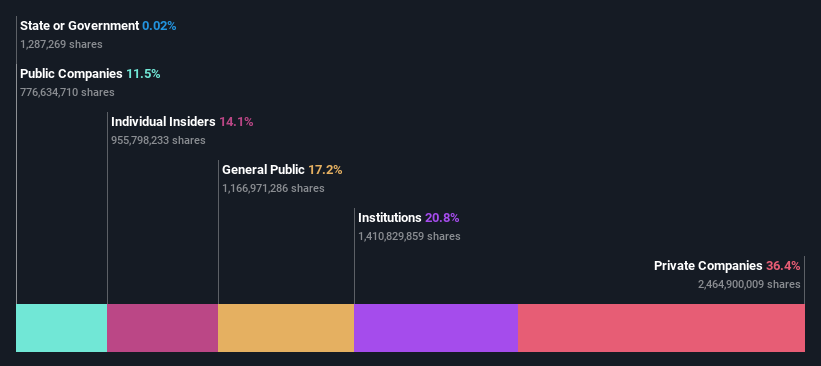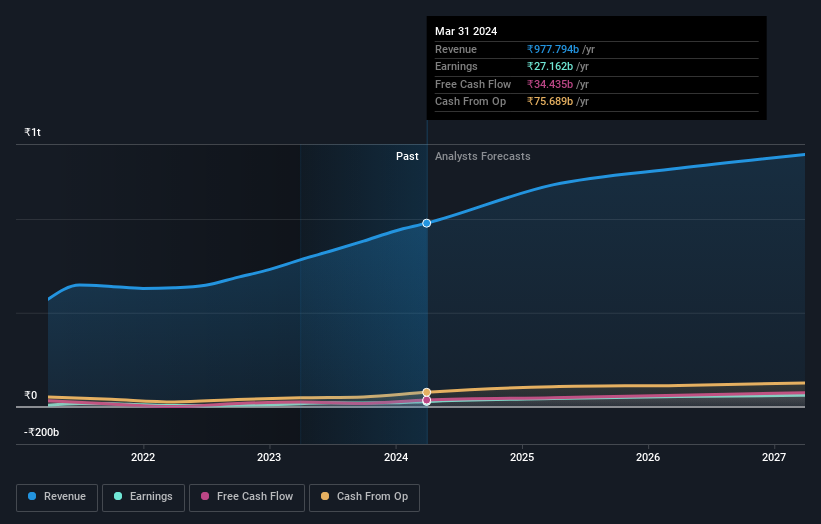- India
- /
- Auto Components
- /
- NSEI:MOTHERSON
Samvardhana Motherson International Limited (NSE:MOTHERSON) most popular amongst private companies who own 36% of the shares, institutions hold 21%

Key Insights
- The considerable ownership by private companies in Samvardhana Motherson International indicates that they collectively have a greater say in management and business strategy
- The top 5 shareholders own 57% of the company
- 14% of Samvardhana Motherson International is held by insiders
If you want to know who really controls Samvardhana Motherson International Limited (NSE:MOTHERSON), then you'll have to look at the makeup of its share registry. We can see that private companies own the lion's share in the company with 36% ownership. Put another way, the group faces the maximum upside potential (or downside risk).
Institutions, on the other hand, account for 21% of the company's stockholders. Generally speaking, as a company grows, institutions will increase their ownership. Conversely, insiders often decrease their ownership over time.
Let's take a closer look to see what the different types of shareholders can tell us about Samvardhana Motherson International.
Check out our latest analysis for Samvardhana Motherson International

What Does The Institutional Ownership Tell Us About Samvardhana Motherson International?
Institutional investors commonly compare their own returns to the returns of a commonly followed index. So they generally do consider buying larger companies that are included in the relevant benchmark index.
We can see that Samvardhana Motherson International does have institutional investors; and they hold a good portion of the company's stock. This suggests some credibility amongst professional investors. But we can't rely on that fact alone since institutions make bad investments sometimes, just like everyone does. It is not uncommon to see a big share price drop if two large institutional investors try to sell out of a stock at the same time. So it is worth checking the past earnings trajectory of Samvardhana Motherson International, (below). Of course, keep in mind that there are other factors to consider, too.

Hedge funds don't have many shares in Samvardhana Motherson International. Looking at our data, we can see that the largest shareholder is Shri Sehgals Trustee Company Private Limited with 14% of shares outstanding. For context, the second largest shareholder holds about 13% of the shares outstanding, followed by an ownership of 12% by the third-largest shareholder.
On looking further, we found that 57% of the shares are owned by the top 5 shareholders. In other words, these shareholders have a meaningful say in the decisions of the company.
While studying institutional ownership for a company can add value to your research, it is also a good practice to research analyst recommendations to get a deeper understand of a stock's expected performance. Quite a few analysts cover the stock, so you could look into forecast growth quite easily.
Insider Ownership Of Samvardhana Motherson International
The definition of company insiders can be subjective and does vary between jurisdictions. Our data reflects individual insiders, capturing board members at the very least. Management ultimately answers to the board. However, it is not uncommon for managers to be executive board members, especially if they are a founder or the CEO.
I generally consider insider ownership to be a good thing. However, on some occasions it makes it more difficult for other shareholders to hold the board accountable for decisions.
It seems insiders own a significant proportion of Samvardhana Motherson International Limited. It is very interesting to see that insiders have a meaningful ₹188b stake in this ₹1.3t business. Most would say this shows a good degree of alignment with shareholders, especially in a company of this size. You can click here to see if those insiders have been buying or selling.
General Public Ownership
With a 17% ownership, the general public, mostly comprising of individual investors, have some degree of sway over Samvardhana Motherson International. This size of ownership, while considerable, may not be enough to change company policy if the decision is not in sync with other large shareholders.
Private Company Ownership
Our data indicates that Private Companies hold 36%, of the company's shares. It's hard to draw any conclusions from this fact alone, so its worth looking into who owns those private companies. Sometimes insiders or other related parties have an interest in shares in a public company through a separate private company.
Public Company Ownership
We can see that public companies hold 11% of the Samvardhana Motherson International shares on issue. It's hard to say for sure but this suggests they have entwined business interests. This might be a strategic stake, so it's worth watching this space for changes in ownership.
Next Steps:
It's always worth thinking about the different groups who own shares in a company. But to understand Samvardhana Motherson International better, we need to consider many other factors. Consider for instance, the ever-present spectre of investment risk. We've identified 1 warning sign with Samvardhana Motherson International , and understanding them should be part of your investment process.
If you would prefer discover what analysts are predicting in terms of future growth, do not miss this free report on analyst forecasts.
NB: Figures in this article are calculated using data from the last twelve months, which refer to the 12-month period ending on the last date of the month the financial statement is dated. This may not be consistent with full year annual report figures.
New: Manage All Your Stock Portfolios in One Place
We've created the ultimate portfolio companion for stock investors, and it's free.
• Connect an unlimited number of Portfolios and see your total in one currency
• Be alerted to new Warning Signs or Risks via email or mobile
• Track the Fair Value of your stocks
Have feedback on this article? Concerned about the content? Get in touch with us directly. Alternatively, email editorial-team (at) simplywallst.com.
This article by Simply Wall St is general in nature. We provide commentary based on historical data and analyst forecasts only using an unbiased methodology and our articles are not intended to be financial advice. It does not constitute a recommendation to buy or sell any stock, and does not take account of your objectives, or your financial situation. We aim to bring you long-term focused analysis driven by fundamental data. Note that our analysis may not factor in the latest price-sensitive company announcements or qualitative material. Simply Wall St has no position in any stocks mentioned.
Have feedback on this article? Concerned about the content? Get in touch with us directly. Alternatively, email editorial-team@simplywallst.com
About NSEI:MOTHERSON
Samvardhana Motherson International
Engages in the development, manufacture, supply, and sale of components for automotive original equipment manufacturers in India, Germany, the United States, and internationally.
Flawless balance sheet with solid track record and pays a dividend.
Market Insights
Community Narratives




